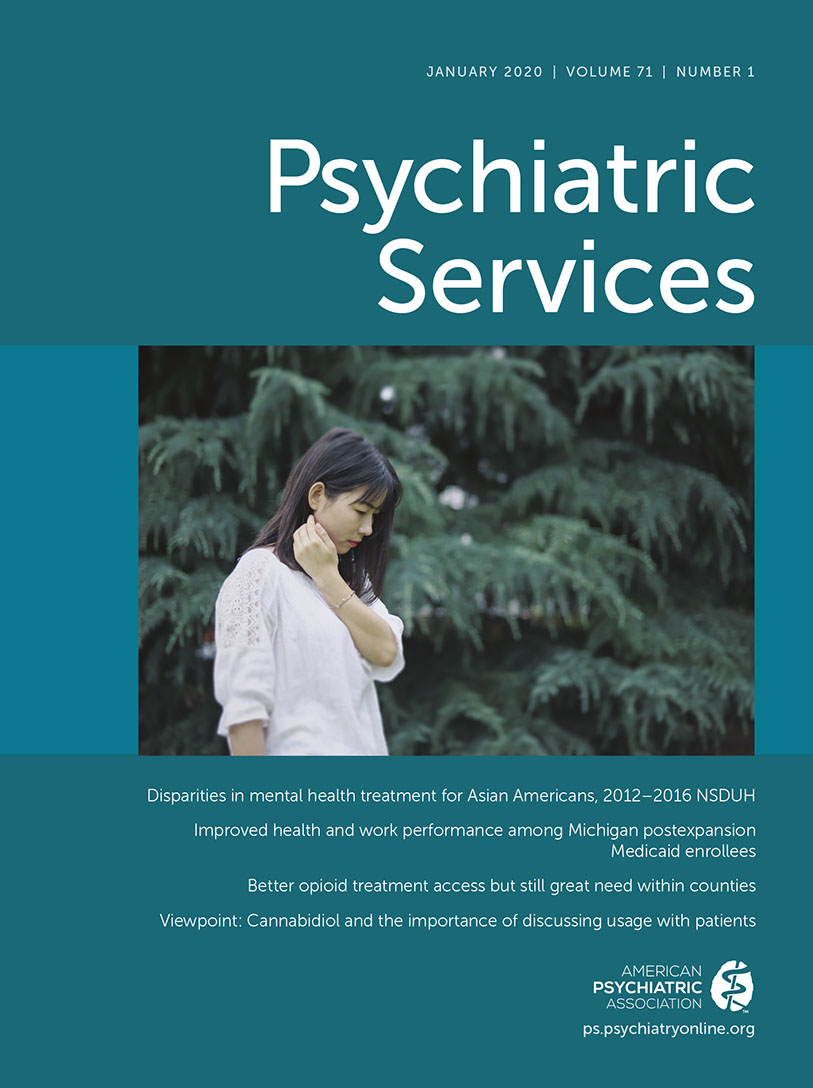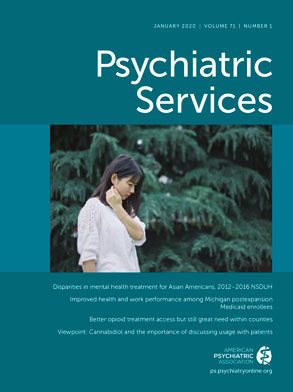Many physicians feel ill equipped to discuss cannabis and its complexities. In recent years, products containing cannabidiol (CBD), one of the main chemicals derived from cannabis, have become widely available. Although CBD is one of more than 100 cannabinoids in the
Cannabis plant (
1), by itself it may not cause a “high.” The other notable cannabinoid is THC, or δ-9-tetrahydrocannabinol, often referred to as the psychoactive component of cannabis, given that it is responsible for the euphoria associated with cannabis use. Based on the genetic profile of the plant, varying ratios of THC and CBD are produced and can be extracted. Compared with THC, CBD has lower affinity for the body’s CB-1 and CB-2 receptors but may be able to modulate or indirectly activate CB-1. CBD is also a known agonist of the serotonin 5-HT
1A receptor, which has implications for whether CBD has psychoactive properties (
1,
2). CBD acts directly and indirectly at multiple receptors aside from the CB and 5-HT
1A receptors (
2). Furthermore, CBD is marketed for multiple psychiatric indications (
3).
CBD Products and Lack of Evidence for Psychiatric Indications
CBD products can currently be purchased online, over the counter, and at cannabis-specific dispensaries and are largely unregulated. CBD products in many forms are proliferating, visible at our favorite retailers and in advertisements. The CBD industry is projected to be a multibillion-dollar enterprise.
One CBD formulation (Epidiolex) has been approved by the U.S. Food and Drug Administration (FDA) for rare forms of childhood epilepsy; no other CBD-containing products have been approved (
4). Given that these products would qualify as drugs under the Federal Food, Drug, and Cosmetic Act, the FDA has issued several warning letters to companies that are selling CBD with claims to diagnose, cure, mitigate, treat, or prevent disease. As stated in the FDA press release, the “FDA continues to be concerned at the proliferation of products asserting to contain CBD that are marketed for therapeutic or medical uses. . . . Selling unapproved products with unsubstantiated therapeutic claims is not only a violation of the law, but also can put patients at risk, as these products have not been proven to be safe or effective” (
4).
The FDA has also raised concern about whether the amount of CBD in these products and the presence of THC in varying degrees is accurately reported. If the THC content in a product does not exceed 0.3%, the product is considered hemp and can be marketed as CBD (
4). Multiple studies demonstrate that CBD concentrations are often mislabeled and that THC is found in many products (
2). Because there is no guideline for dosing, even if the labeling was accurate, there is no evidence-based guidance to suggest the right dose of CBD and for what indication. No large high-quality clinical trials have been done for most of the indications suggested by CBD retailers or for specific products. On the other hand, consumers of CBD report using it mostly for pain, anxiety, and depression (
3).
By electing to rely on CBD for these indications, users may not seek appropriate evidence-based mental health treatments, such as therapy and approved medications. They may be relying on solutions that are not evidence based, are not reliable in matters of dose, and may not have sustaining benefits. Delaying effective treatment for anxiety and depression can worsen outcomes, prolong suffering, and increase disability in the long term. There is also a concern about possible risks associated with these products.
Risks and Risk Perception
As Americans expand and normalize use of CBD, perception is affected. Lower perceived risk is associated with increased incident use of cannabis among adolescents (
5). With CBD, normalization of products through their rapidly increasing presence is concerning. In an ideal world, we would all have a clear understanding of the nuances of CBD, THC, and cannabis. However, in reality there is confusion around CBD, THC, and cannabis as well as what constitutes an evidence-based treatment option. A user with the initial intention of using CBD may adopt cannabis through a misunderstanding. Another individual may start with CBD, try cannabis—out of curiosity or financial need given that cannabis is often cheaper than purified CBD—and eventually develop a cannabis use disorder. After all, 10% to 30% of people who use cannabis develop cannabis use disorder. That is particularly concerning for adolescents because the risk of addiction and negative cognitive effects increases with earlier age of first use (
1). Casting cannabis-derived products into our daily environments and lives without a full understanding of the implications has put us in a hazardous situation.
Other, more direct risks of CBD include interactions with medications, given that CBD is pharmacologically active and metabolized through cytochrome P450 mechanisms. As a cytochrome P450 inhibitor, CBD can increase warfarin or benzodiazepine levels and cause adverse gastrointestinal effects and liver function abnormalities (
2). Without regulation, in addition to the problems caused by mislabeling, these products risk being contaminated or can contain other harmful substances.
Recommendations
On a clinical level, in the absence of data, it is important to continue to communicate with patients about their beliefs about CBD and cannabis and their use of and interest in using CBD-containing products, providing education when possible while maintaining an alliance. This balancing act involves learning about patients’ views, needs, and how well they understand, for example, how CBD, THC, and cannabis are defined as well as the evidence for the indications listed on the products.
On a population health level, the FDA continues to consider safety and regulatory requirements of CBD. Regulation, while costly, offers the potential to study and hold these products to a higher standard; this may mitigate some of the concerns raised above, if done well. A lot is at stake, given that CBD is a blossoming industry, and there is great interest in adding the chemical to everything from supplements to ice cream, especially with the number of consumers hailing it as a treatment for many conditions, including depression, anxiety, and pain. Indeed, a purified CBD was approved by the FDA for treatment of rare seizure disorders, but it comes at a cost of approximately $30,000 a year (
4).
Finally, it is important to consider, if there is so much that CBD can do—do we really feel comfortable having it in our lip balm, lotion, and ice cream?

